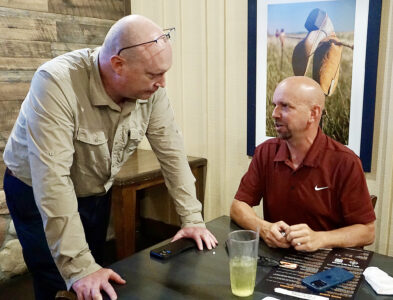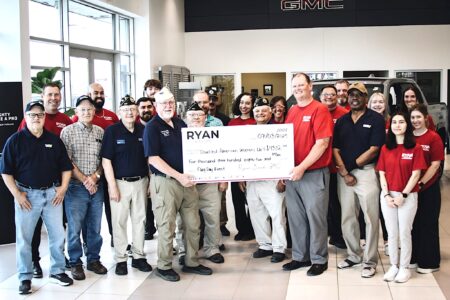Home grow advocates call for medical marijuana reforms

Submitted Photo This custom hemp press is on Heather Graner’s hemp farm in Dickey County. Photo from Heather Graner.
North Dakota has had a medical marijuana program since it was passed as an initiated measure in the 2016 general election. The passage of the bill came as a shock to some at the time, who didn’t expect the measure to pass the spit test in this deeply red state. The original measure included language that allowed for an unlimited number of Compassion Centers and even the option for patients to grow their own plants at home if they lived more than 60 miles away from one.
After the dust cleared and the rubber hit the road, the North Dakota Legislature hammered out a functional code, but one that was stripped of some of the libertarian excesses that North Dakotan’s voted for.
With the 2023 legislative session blazing ahead, some marijuana activists calling themselves the North Dakota Cannabis Caucus (NDCC) are shrugging off the defeat of last years failed attempt at recreational legalization, in favor of reforming the state’s current medical marijuana laws.
Christina Carruthers is a recent transplant to North Dakota who became aware of the NDCC after researching the process to apply for a medical card.
“I have spoken to quite a few patients. They’ve noticed that with the limited amount for compassion centers in the state, it leads to higher prices. They’re not able to get their medication,” Carruthers said, “One lady I spoke with said there’s a specific tincture that her son takes and the one compassion center she can get it at, they refuse to make it. So now at this point, she’s got to source it from out of state or come up with some way to get it.”
The NDCC has drafted a number of proposed bills advocating for the legislature to bring back the option for patients to grow their own cannabis plants in their homes, and if need be further process them into the desired form of consumption.
The parent of one such patient is Heather Graner, a hemp farmer from Dickey County who first became aware of medicinal marijuana while seeking treatments for her son Isaiah. As a baby, Isaiah was diagnosed with infantile spasms, leading doctors to tell Graner he wouldn’t live to be 5 and that he would be severely handicapped. Things took a particularly hard turn when Isaiah turned 8.
“They locked him in a padded closet in the West Fargo School District. He was becoming extremely violent and no one understood him. He was basically nonverbal. Every day with cannabis I saw miracles,” Graner said.
Graner and her family soon moved to Colorado to have access to the state’s medical marijuana program. Isaiah was put on a high dosage of edible THC gummies, eventually as high as 300 mg a day. The average package of edible cannabis product is typically 100 mg. Over the next three years the edibles reduced Isaiah’s seizures and helped manage his moods, until he went off the treatment when the family moved back to North Dakota after he turned 14.
“We came up here this summer and he wasn’t allowed to eat edibles, so we went off and by the time end of summer came around he was like, ‘I don’t really want to go back on it’. He wasn’t having seizures and I figured if he can communicate with me that much, we’re not going back on it,” Graner said, “He is unmedicated now. He’s thriving and he’s doing fine, but I can tell you this, without the high doses of THC edibles for three years I would have lost my kid.”
For all of the positives Graner and her family had from the experience, returning to North Dakota has driven home what she feels are gaps in the medical program currently in place here. One issue she pointed to was that edibles were not an option for patients in North Dakota, who are limited to smoking or vaping flower and some forms of extracts.
“The natural oils and stuff are so unpleasant. It’s really hard to get some people to do that every day, especially your child,” Graner said, “With edibles we’re just adding a little bit of sugar. It’s no different than flavoring amoxicillin or something like that.”
Another major area of concern for Graner and the NDCC is the high costs North Dakota patients face. According to a study from the website nuggmd.com, North Dakota averages $384 for one ounce of medical marijuana, which comes in as the 2nd highest in the nation behind only Washington D.C.
“They’re neglecting medical in this state. They haven’t licensed enough grows in this state. For patients to access what they need without home grow, it’s impossible. If you can find a person generous enough to make you the medicine, it’s going to cost you $300 a month at a minimum,” Grander said, “If you get it from a dispensary, you’re going to be $1,200 to $1,500 a month, and that’s if you can find it on a regular basis. I was at $1,400 a month buying his medication. Why would you start your patient on a medication that is not going to be there next week when you go to get it because the availability is not there?”
Graner was driven to invest in cultivating and processing her own CBD products due to the rising costs of the strains her son required when they lived in Colorado, and has developed her own in-house hemp press to extract and manufacture CBD. A group effort involving her business partner, Gordon Brummund, and some local Hutterites, her custom press features a 12×17-inch press plate that delivers 200 tons of thermostat-controlled pressure. The press is already on a trailer ready for spring harvest. Graner hoped to break it in this weekend.
“Gordon’s half of the developing team. Everything I thought up, he figured out a way to make it happen,” Graner said, “There isn’t another one that size on the market. Third time’s the charm on making the heat plate consistent. ”
As it stands the N.D. Legislature is making some moves to fill in some of the gaps identified by critics and patients. HB 1202 was filed in the House seeking to open the door for edibles, albeit with tight constraints on their appearance and packaging and a limitation of 500 mg of edible marijuana product. A slew of other bills are prosing changes to reduce the costs for compassion centers to renew their licenses and to ease the process for patients aged 65 and older to apply for their medical card.
While home grow isn’t up for consideration yet, the caucus has been in communication with several legislators about the concept. Minot Rep. Matthew Ruby is co-sponsor of HB 1202, and said personally he doesn’t agree with those fearful of introducing home grow as an option.
“Opponents point to a potential black market, but that already exists. It’s not an easy plant to grow so I’m told, so I don’t think it’s something that would be as big an issue than others do,” Ruby said.
Carruthers admitted there was some consternation within the caucus over the level of access to their homes authorities may require for home grow to be an option, but feels ultimately that is an appropriate concession.
“That’s the way that we can get it passed and they can be sure that we’re not doing anything extra with it. I think it would be a win-win for everybody,” Carruthers said.



